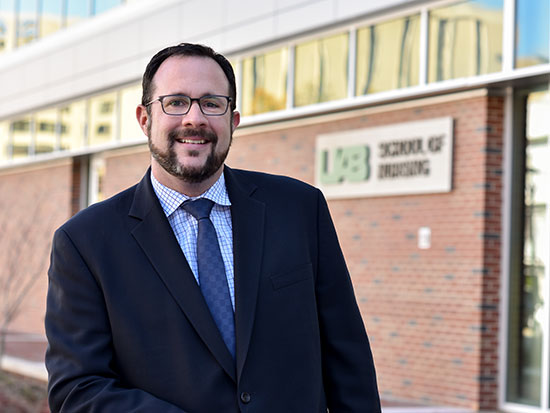 As UAB moves to online and alternative teaching across the university in response to the COVID–19 pandemic, we talked with two experienced students — and educators — to get their thoughts on making the most of online courses.
As UAB moves to online and alternative teaching across the university in response to the COVID–19 pandemic, we talked with two experienced students — and educators — to get their thoughts on making the most of online courses.
Samira Laouzai is deputy director and manager of eLearning Services at UAB. She is also an online student. Bryan Combs, an assistant professor and director of Nurse Practitioner Pathways in the School of Nursing, earned two master’s degrees and a doctorate from the school over five years, all through “distance-accessible” courses, which combine online coursework with in-person clinical experiences.
Q: What are some of the common questions you hear from students about online learning at UAB?
Laouzai: "One of the key questions we receive is if the online course will be synchronous or asynchronous. [That is, if classes meet at a specified time or not.] This is at the discretion of the faculty and the teaching style they use. While there is value in interacting synchronously with the instructor and peers, some instructors record and archive the live sessions and provide them as an alternative to attending those live sessions.
“Another question we receive from students is if they have to be technically savvy to be successful in an online environment. Technology is used as a tool to support learning, but students have access to guides and video tutorials on the eLearning website and to 24/7 Canvas support, so technology does not become a barrier to learning.”
 Samira LaouzaiCombs: "For those individuals who may not be very comfortable with technology or may be hesitant or worried, my experience as a faculty member here at the School of Nursing is that those worries can be overcome pretty quickly.
Samira LaouzaiCombs: "For those individuals who may not be very comfortable with technology or may be hesitant or worried, my experience as a faculty member here at the School of Nursing is that those worries can be overcome pretty quickly.
“I have taught in a distance-accessible course at the School of Nursing for six years now and I try to apply all of what I learned as a student and as a faculty member. I tell my students, ’It may take a bit of time to get used to distance-accessible education and get into your new schedule, but stay calm, stay organized and trust the process.”
Q: What are some common traits you see in students who are successful with online learning — or that you have used?
Combs: "As a student the biggest thing is to make sure you plan accordingly. When I was new to distance-accessible education I had to learn that I was the person responsible for making me listen to lectures or do required reading because there was not a set time where I had to go to a room and listen to a lecture. The most important thing I learned along the way was that I was responsible for my schedule and making time to review material, study and be successful in my coursework.”
Laouzai: “Time management, self-motivation and discipline are key to being successful in an online environment. While the instructor is there as a resource, students are eventually responsible for remembering to complete course work and meet deadlines.”
Q: What are some strategies you have used as a student?
 Bryan Combs
Bryan Combs
Combs: "The most important strategy is, as best you can, set aside time on your schedule to do the work. I had three hours every day where my wife knew I was doing class work and I would not be able to do anything else. Many times, for myself and students I teach at the beginning of this type of course work, we think, ‘I can just review two modules next week and take this week off.’ However, I wholeheartedly believe that mindset will inevitably backfire — things always come up. So create a schedule, keep it, and stay ahead of work and don’t let it pile up.”
Laouzai: “Creating a favorable learning space is very important to be successful in an online environment. Students have to find spaces that are peaceful and quiet, with good lighting, free of distraction and proper seating — at a desk or table rather than in bed.”
Combs: “When you have that set time to work and study try as best you can to get away from the distractions of life. I know that is easier said than done — but going to a quiet room or office can be very helpful. It will allow that time you do set aside to be much more beneficial and productive. The time you set aside will not be helpful if you can’t concentrate.
“Also, stay organized. As a student I used Microsoft Office to schedule everything in my life: meetings, study time, and even tasks or assignments. I used that because it is what was easiest for me, but use whatever organization format is best for you to write out what you have to do this week or this month. I believe if it is not planned out, it typically will not work out. This planning should include everything in your life. I kept my work requirements, school requirements and things I needed to do for my family all in one area so I always knew what was coming up.”
Q: Do you have any advice on how to handle situations where a student is confused by an instruction or requirement in a course?
Laouzai: “Instructors use different methods to encourage students to ask questions. Some create a space where students can post questions and receive answers from the instructor and their peers. Other instructors have virtual office hours where students can make appointments or simply drop in online. In general, instructors desire open communication with the students in their class, and would rather know when a student is struggling than not know at all.”
| Ask questions, learn more about UAB resources, find more tips and get technical help on this Student Support for Remote Learning site from UAB eLearning. |
Q: What other resources are available?
Laouzai: “Many students fear that they may be at a disadvantage when taking online courses due the misconception that online students do not have access to the institutional support services. UAB strives to provide equal access to its services to all students regardless of the course delivery mode. The University Writing Center and the UAB Libraries are just a few examples of units that provide services to face-to-face and online students.”
